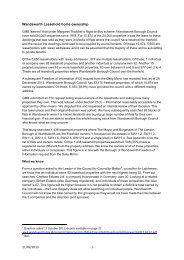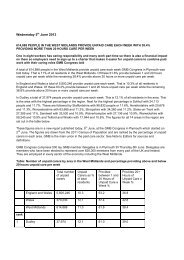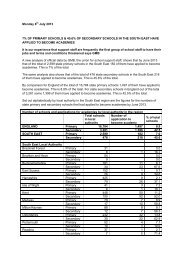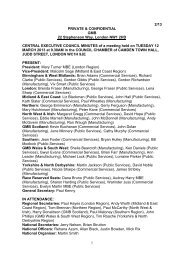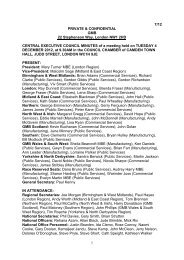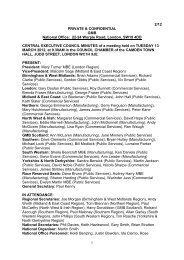WO toolkit 2012 complete.pdf - GMB
WO toolkit 2012 complete.pdf - GMB
WO toolkit 2012 complete.pdf - GMB
You also want an ePaper? Increase the reach of your titles
YUMPU automatically turns print PDFs into web optimized ePapers that Google loves.
SECTION 5.31<br />
GROUP FIVE<br />
DISCIPLINE AND DISMISSAL<br />
31. Can I be represented in a disciplinary or grievance hearing?<br />
Workers have the right to be accompanied at disciplinary and grievance hearings and appeals,even if<br />
their employer does not recognise their union.<br />
This right is available to all workers(including agency and home workers)regardless of the number<br />
working for their employer.<br />
You can choose who to have as your companion,providing the person is either:<br />
• A union lay official certified as experienced or trained in representing workers;<br />
• a trade union officer; or<br />
• another of the employer’s workers.<br />
The right applies to:<br />
• Any disciplinary hearing which could result in a formal warning,or in the employer taking some<br />
other action e.g.dismissal,suspension.<br />
• Appeal hearings.<br />
• Grievance hearings(i.e.a hearing which concerns the performance of an employer’s duty towards<br />
a worker).<br />
The request to be accompanied must be‘reasonable’,so do not leave it until the last minute.It is best,<br />
though not obligatory,to put it in writing.<br />
The employer must allow your companion to address the hearing to:<br />
• Put your case,<br />
• sum up that case and<br />
• respond on your behalf to any view expressed at the hearing.<br />
Your companion can also confer with you during the hearing.S/he will therefore normally be able to<br />
address the hearing both at the beginning and end of the proceedings and will also have the<br />
opportunity to respond to views expressed.However,the employer is not required to permit the<br />
companion to:<br />
• Answer questions on your behalf,<br />
• address the hearing if you indicate that you do not want the companion to do so,or<br />
• use the powers in a way that prevents the employer from explaining his case or any other person<br />
making his contribution.



